| THE FILMS [Part 2: 1987-2015] |
|
(1987) (73:11)
With the world facing annihilation from nuclear war, a scientist uses the work she has been doing on suspended animation to freeze her son Paul (Rob Bartlett) and his girlfriend Barbra (Debbi Stevens) in the hope that they can start a new life when the war is long over. 25 years later, the two awake and set out into the new world, but on the morning after their first night in camp they are chased and eventually kidnapped by a gang of thugs, who take them back to a primitive community run by an egotistical self-appointed leader who calls himself The Messiah (Patrick Oliver).
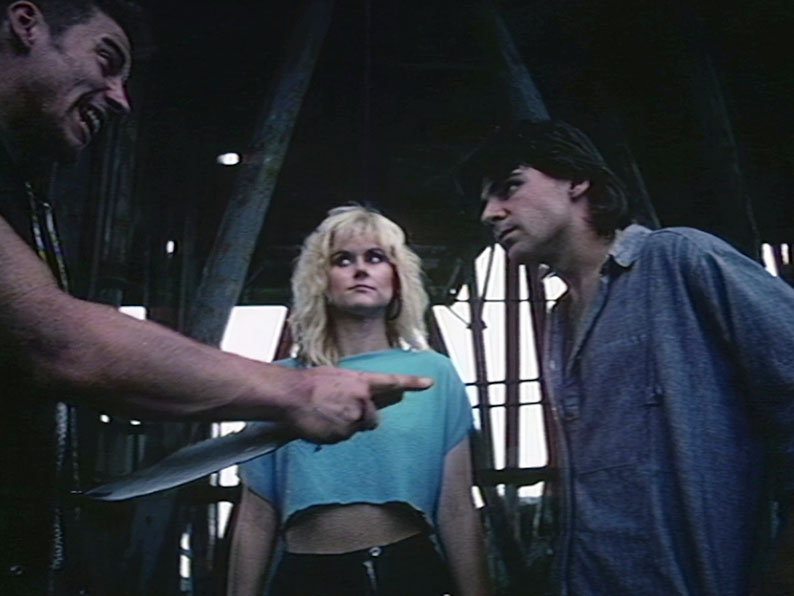
Murphy's take on the post-apocalyptic wasteland gang subgenre was more than a little late to the party, which by then had already given us Deathsport (1978), The Ultimate Warrior (1975), The New Barbarians (1983), the BBC TV series Survivors (1975) and a whole host of others, including the first three of George Miller's standard-setting Mad Max movies. That doesn't mean there's no material left for an inventive microbudget moviemaker to mine, but Death Run tends to recycle tried and tested tropes, ideas and imagery, and the lack of budget and professional experience on both sides of the camera really impacts the results. On the plus side, the junkyard location is a good one, and there's a slice of feminine revenge in the finale that I liked and in a way prefigures an element from the later Mad Max: Fury Road. I'm also going to cut Murphy the usual low budget slack of suggesting the people have been cutting a basic existence in the wasteland because their clothes are a bit tatty and they have smears of dirt on their faces. And I gather from the special features I'm not alone in finding the homoerotic overtones into all the shots of bare-chested and bodybuilding muscular men that seem to make their way into Murphy's films impossible to ignore. But this still has the feel of the sort of thing I saw a lot of when I was teaching media, where students see a film they all love and then try and make their own version with their mates and no money, a trend that The Blair Witch Project was an absolute gift to (and a nightmare for assessors).
Performance-wise, we're back in the land of enthusiastic amateurs trying their often unconvincing best, but all caution is thrown to the four winds by Murphy regular Patrick Olliver, whose scenery-chewing turn as The Messiah suggests he planned to use the film as audition material for pantomime villain roles at Christmas. The lack of stunt performers also makes itself felt, as Paul and Barbara flee two motorcycle riders who chase them on machines that never get out of the low end of first gear, and later make their escape in a car that would probably go faster if they got out and pushed. The fights are also particularly limp, with blows delivered with the all the force of a saucy nudge, and punch-ups performed with a lack of energy and commitment that suggests the performers were all terrified of getting even the smallest bruise. Despite my age and infirmity, I reckon I could take them all, no problem. Nice try, it's no Tristan, and I can't be the only one who on hearing the defiant cry of "He's not the Messiah!" mentally added "He's a very naughty boy."
(1988) (83:42)
Murphy's second historical drama is a fanciful take on the post-Arthurian legend, with Tristan's Stephen Harris cast as muscular knight, Owen of Zennor, who as the film begins stumbles across a group of Druids preparing to sacrifice a virgin named Clotilde (Abigail Blackmore), apparently to protect themselves from the sorcery of witches. While they're at it, they're going to also cut the off hands of a thief named Keiran (Rob Bartlett), who was caught trying to steal their sacred dagger and golden chalice. Owen rescues them both, as they flee to safety, it turns out that both Owen and Clotilde are on separate quests to reach the fabled island of Avalon, Owen because it is the rumoured final resting place of King Arthur Pendragon, Clotilde because her true love Edwin went on a similar quest from which he has never returned. When they arrive at the beach from which Avalon should be visible, however, there is nothing but empty sea, but by chance their conversation is overheard by an ageing Merlin (Patrick Olliver, really reining it in after the excesses of Death Run), who transforms himself into the younger knight he once was and shows them the way to the hidden isle, leaving them on their arrival but promising to return when he is most needed. Fully aware of their presence, however, is island ruler Morgana (Debbi Stevens), whose magical powers are set to present them with their greatest challenge.
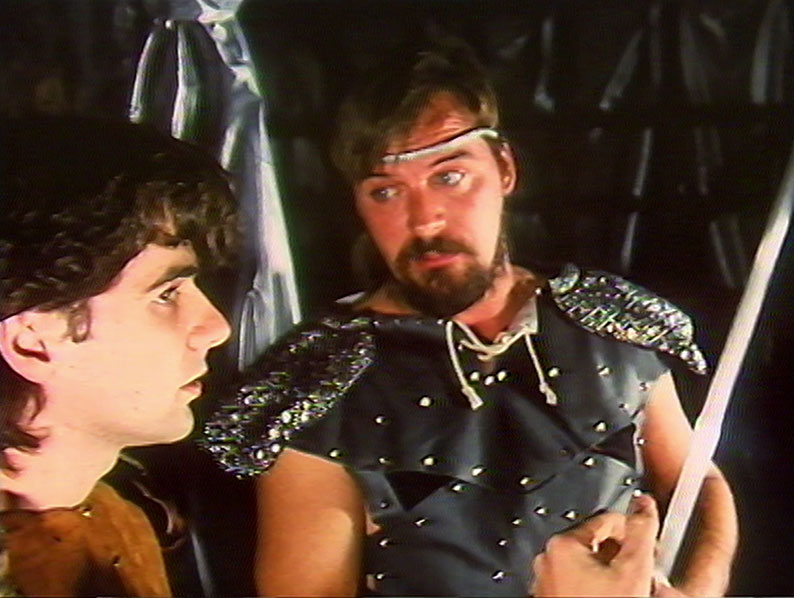
The Olde English of Tristan is abandoned here for a blend of familiar "Yes, my liege!" historical drama dialogue and Keiran's more light-heartedly conversational line delivery, which is often used to comically undercut the more serious proclamations of his companions. Keiran is Murphy's only real attempt at a comedy sidekick, and while some of his lines fall a little flat, for the most part he delivers, thanks in no small part to a cheerily engaging performance from Rob Barlett. Part young Melvin Hayes, part early Dudley Moore, Keiran is a character I liked from the off, as the Druid leader portentously announces to his flock that the punishment for theft will be the severing of his hands, and Keiran complains with a imploring whine, "I can spare one hand, but please, not both!" Then, as the trio flee, pursued by the Druids, Clotilde realises that Keiran has stolen the chalice again and pleads with him to drop it. After initially refusing due to its monetary value, he eventually tosses it over his shoulder and it lands squarely on the head of the Druid chief, knocking him cold and prompting a loud laugh from me. There's more nudity here than in Murphy's previous films, and his first sex scene, as well as some optical effects work, a bit of stop-motion creature animation at the climax, and a really well done scene in which Owen and Keiran fight their doppelgangers. The combat is initially a bit limp but improves at the film progresses, and the story itself is engagingly told. Although still very much a Michael J. Murphy film, it also feels like a progression on what has gone before, with Murphy trying out new techniques, ideas and characters. I enjoyed the results, and there's even a genuinely creepy sequence where the dead are summoned back to life by Morgana to fight the new arrivals, one that recalls imagery from both Plague of the Zombies and Night of the Living Dead.
(1989) (87:35)
In a quiet country village, London-born Sarah (Judith Holding) takes up a new job as secretary to Dr Edward Lucan (Patrick Olliver), a disabled author who is writing a book based on his research into the occult. He has a fractious relationship with his bossy nurse Kelly (Therese Hickland), who has a strong dislike for earthy cook and handyman Davies (Neil Goulbourn), with whom Sarah strikes up a tentative friendship. From the moment she arrives, Sarah starts having headaches and occult-themed nightmares, and begins confiding in friendly young local priest Father Daniel (Philip Lyndon), who reveals that he has also suffered similar symptoms since he came to the village. The priest fears the influence of dark forces, but it's when Sarah looks into what happened to her predecessor that she really becomes concerned for her own wellbeing.
There's a hint of the likes of City of the Dead, The Sentinel and the later House of the Devil to Sarah's predicament, that of the innocent outsider who begins to suspect that she may be a target for sinister intent. It's a tried and trusted formula that's atmospherically handled here, thanks in part to restrained direction, the consistency of Murphy's cinematography, and Mark Thomas's moody score. While hardly award-worthy, the performances are fairly robust here, with Jude Flanagan making Sarah a sympathetic and likeable lead, and Neil Goulbourn not running away with Davies's West County accent and dropping snide remarks about Nurse Kelley under his breath. There's also some nicely naturalistic work from Patrick Olliver as Dr. Lucan, Philip Lyndon as Father Daniel, and Greg Clark as Tony, a local pet shop owner who takes a fancy to Sarah.
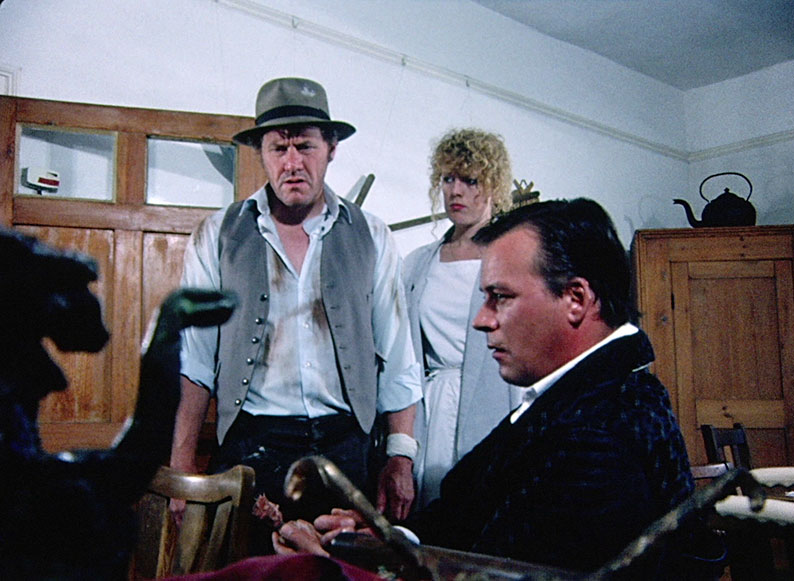
The one scene that doesn't really cut it for me comes when Nurse Kelly sets Sarah up on a date with her son Steve (Alan Janson), a complete and utter wanker who treats women like disposable tissues and deliberately picks a fight with two huge local bruisers, a punch-up that feels as artificial and staged as we know it was – I've seen a few pub fights and even been in a couple, and nobody brawls like these three wrestling nitwits. That aside, a solid and atmospheric job that stumbles a little at the climax, where interesting prosthetic effects do battle with some wobbly optical work and a credibility issue that requires us to swallow the notion that a whole flock of believers could suddenly and instantaneously switch religion. Oh, if only.
(1990) (90:22)
Pop superstar Anna Bell (Debbi Stevens) decides to take some much needed time out to write some new songs in a quiet countryside house she anonymously bought three years earlier. Her manager Mike (Philip Lyndon) wants her to come back to London with him, particularly when it's reported that a local girl has been murdered and the killer is still at large. Anna flatly and one point hysterically refuses, so Mike is forced to accept her decision and departs for London, leaving the tired star with the solitude that she has been craving. The next day, local handyman Mathew (Rob Bartlett) turns up at her door offering to fix her broken fence. Initially apprehensive, Anna eventually agrees, and when he does a decent job she asks him to do several other jobs around the house and garden. Over the course of the next few days the two become more relaxed in each other's company, and eventually end up in Anna's bed and the sort of relationship that both appear to have been aching for.
If it all sounds a bit too straightforward for Mr. Murphy, know that there's more going on than here than I've covered in the above synopsis. For a start, it's clearly inferred that Mike is financially feeding off Anna's success, and he makes sure she gets the pills she needs to keep her pumping out the moneymaking hits, which Anna mixes with alcohol as a crutch that she has clearly been relying on for some time. And then there's the title sequence, where we see the hands of an individual who is never identified as he cuts out articles about Anna Bell and her recent breakup with Craig Cane (Alan Jansen) from magazines and strokes the image of her face with a knife. When Mathew turns up at Anna's door, there's thus a sly inference that those hands belong to him. But do they? If you don't want to know until the film is ready to tell you, then whatever you do, don't scan the credits for the film in the accompanying book, as the game is soundly given away there.
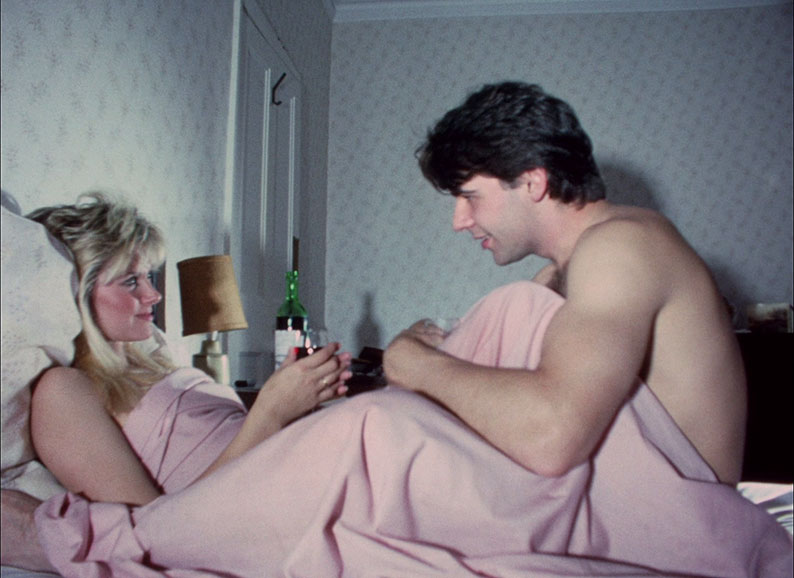
Up to this point, we're in familiar territory, and in the spirit of not having spoilers to avoid I'll refrain from detailing where the story goes next. What I will say is that a revelation I was expecting in the film's final act is unexpectedly delivered even before the halfway mark, raising the always interesting question of where the story will go from here. And there's more. When it does eventually head where I had predicted, the tables are quickly turned and what had by then become a popular psycho thriller trope is turned fascinatingly on its head.
There are no bad performances here, and one really good one. Rob Bartlett is a little more hesitant here than he was as Keiran in Avalon, Philip Lyndon really pushes the laddo aspect of the quiff-haired manager Mike's lack of personality, and Patrick Olliver camps it up in Christopher Biggins style as Anna's spectacularly gay choreographer Guy. What really sells it, though, is the consistently solid Debbi Stevens as Anna, always convincing in her neuroses and able to act drunk without looking like she's acting drunk, if you get my drift. It's she who sells the darkly toned final turn the film takes, which builds to my absolute favourite ending to any Murphy film so far. There are even some interludes for songs that for the most part justify their placement in the drama, and while I won't buying the soundtrack album anytime soon, they're not that bad in their oh-so 80s way.
(1991) (82:33)
In an underground city in the lost continent of Atlantis, the vain and depraved Queen Anteea (Judith Holding) watches in boredom as the latest collection of forcibly recruited gladiators battle to the death for her theoretical amusement. This is a society in decay, ruled over by a creature known as The Master (Philip Lyndon), a powerful mummified gargoyle who is desperately seeking a rare and magical gem known as the Blood Crystal. When High Priest Sartor (Patrick Olliver) delivers the gem, he is then charged by The Master to seek out a very particular young woman known as The Child of the Fire Crystal (a betwitching Debbi Stevens) for reasons that are yet to become clear. On the island's surface, meanwhile, young Melo (Neil Stenson) and his older sister Arian (June Bunday) are searching for food, and when they wander a little too close to the city they find themselves teleported unexpectedly into its caves. Melo is imprisoned and trained to fight in the arena, and Arian is forced to work in the mines serving food to those who have won their arena battle and are now condemned to work the mines until they die. When their absence becomes evident to their father, Cryon (Neil Goulbourn), he and his fellow villagers decide that enough is enough and set out to invade the city and overthrow the island's rulers, even at the cost of their lives.
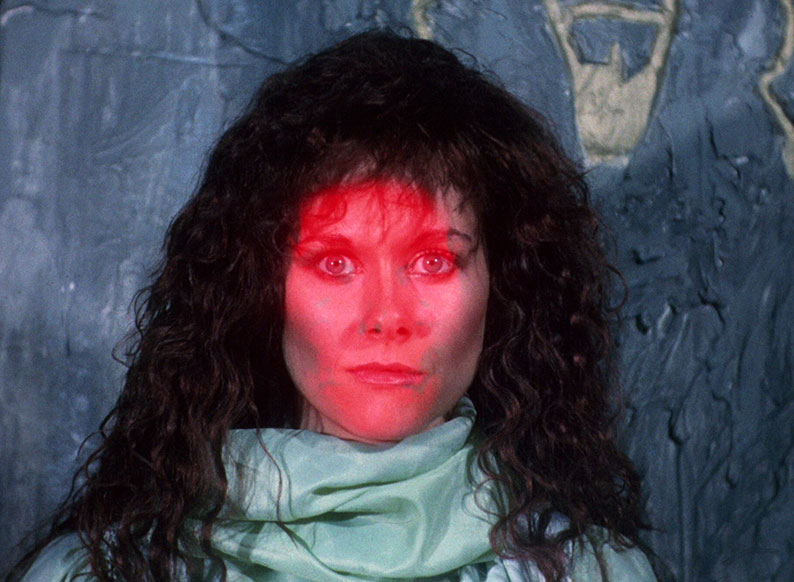
Hiding the fact that you're working on a microscopic budget is a little easier to disguise when you're shooting on location, but once you start constructing sets with whatever you have to hand, it really shows. This, coupled with a theatrical acting style, does sometimes give Atlantis the feel of a stage play written and performed by an amateur theatre group that they have elected to make into a film using all their original costumes and sets. But if you can deal with all that – and by this point in this collection it should be no barrier – then Atlantis definitely has its pleasures. It's a fanciful take on the Atlantis myth concocted by Murphy himself and bearing precious little resemblance to Plato's original or even the variations on the tale that have appeared since. The reliance on gladiatorial swordfights to bring a bit of action to the drama is a weakness, as while the first fight is energetically performed, some of the others hampered by some too-clear attempts to avoid landing heavily on the hard concrete floor or bumping into the wobbly walls. The final, inevitable destruction of the city is a no-budget gem, all small-scale model work, overlaid fire and lightweight debris thrown at the actors, with split screen and matting used to place the performers in the midst of it all. Imagine the destruction of Pompei filmed on the special effects budget of an episode of Blake's Seven and you'll get the idea. Far and away my favourite character is Philip Lyndon's The Master, whose head and body makeup is impressively grotesque, and who late in the film reveals that his genitalia consists of an eye-melting explosion of light.
(1991) (89:10)
Celebrated horror author Raymond Heller (Patrick Olliver) is struggling with his latest novel, scenes from which he visualises using people he meets and observes as the characters. He lives with his American wife Victoria (Amy Raasch) in the old servants' wing of the run-down medieval manor house he owns until he can make enough money for the necessary renovations. The solitude suits the heavy drinking Raymond, but is a bit of a strain on the far younger Amy, who quickly becomes friends with the estate's good-looking handyman Nick (James Reynard), a friendship that begins to move hesitantly towards something stronger. Raymond, meanwhile, has remained good friends with Tanith (Judith Holding), a local woman who claims to have the gift of second sight and someone that Amy has very little time for. Things complicate further with the arrival of Sean (David Charles), a man from Victoria's past life in America, which leads to an incident that is set to change the course of all their lives.
And here it all clicks into place. While in many of Murphy's previous films there was a sense of amateur actors and non-professionals trying their best, here just about everyone is absolutely on point. Patrick Olliver gives his best performance yet as the hard-drinking and artistically frustrated Raymond, and as Nick, James Reynard is winningly naturalistic and makes the character both believable and sympathetic. Best of all is American newcomer Amy Raasch as Victoria in a performance that has the sort of engagement, nuance and conviction that was so often absent from the line-reading acting in Murphy's early films. I'm also going to credit Murphy's screenwriting here, for the generally robust dialogue, and particularly for the lines given to Nick as his relationship with Victoria looks set to develop into something more – his hesitance, uncertainty and level-headedness feels exactly like you think this situation would play out for real. This ensures that I engaged fully with the characters for the first half of the film, and thus had a real investment in their potential fate when things take an unexpected turn (I'm skirting round specifics to avoid spoilers here).
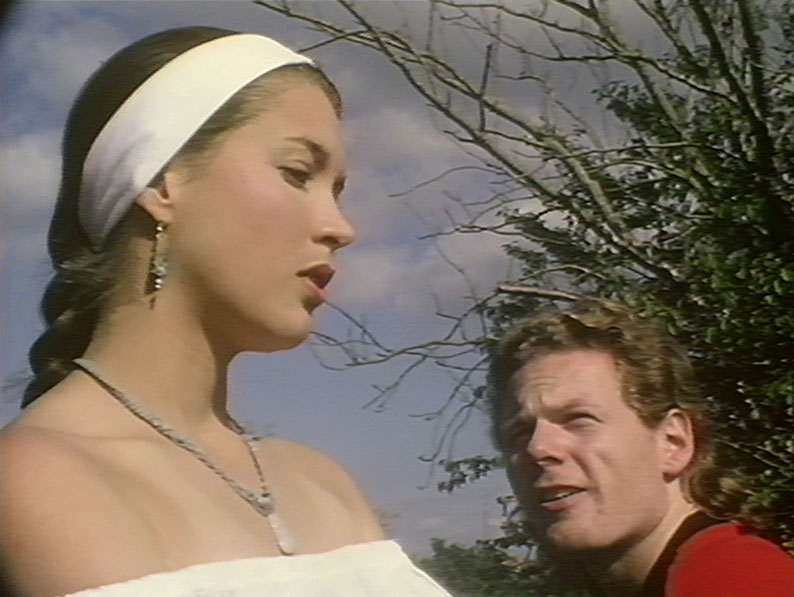
The story itself is a well-structured and involving one, and I can't help suspecting that Murphy has put something of himself into Raymond, an artist who believes in the integrity of his work and refuses to allow any of his books to be optioned by Hollywood studios, a deal that would make him all the money he needs but would, he believes, result in his work being seriously compromised. With that in mind, the one niggle I had with the film is the ending, which despite the film's independent status has the feel of like a studio-imposed addition, though part of me wondered if this was a deliberate movie gag on Murphy's part. I was seriously impressed by Second Sight, perhaps the first film in the set that – a handful of shaky editing decisions apart – doesn't feel like the work of enthusiastic and talented amateurs but a fully-fledged professional movie.
(1993) (95:28)
Having been convicted of murdering both of his parents, dangerous criminal Peter Reece (James Reynard) escapes from prison and immediately sets about collecting his sister and lover Elise (Kate Steavenson-Payne), killing the policemen tasked with guarding her in the process. As Detective Inspector Janet Fairell (Judith Holding) and her team search desperately for leads, James and Elise break into a quiet holiday cottage where newly married American tourists Byron and Megan Shelanvis (Timur Kocak and Heather Raffo) are spending the final days of their honeymoon. Peter ties up Byron and Megan in the attic uses what money they have to try and bargain an illicit trip across the channel with local fisherman Freddy (Neil Goulbourn), while Elise finds herself being hit on by Danny (Luke Massy), a muscular young American ex-pat boxer living and working in the nearby town.
Murphy's confidence as a director and use of a wider pool of actors once again pays off in a film that has its minor ups and downs, but in the end its strengths really do outweigh its weaknesses. Flying the flag for the former is a quartet of strong central performances, with James Reynard once again really shining as Peter, his every threat and piece of sarcastic mockery aimed at Byron and Megan laced with a convincing undercurrent of potentially lethal danger. Kate Steavenson-Payne also seriously impresses as Elise, and in some ways has the most challenging role to pull off convincingly, something she does with real aplomb. Devoted to her brother to the point that she willingly sleeps with him, she nonetheless abhors the violence that Peter so readily dishes out, and finds herself torn between her attraction to Danny and her very real fear of what Peter might do to him should he find out that he is attracted to her. And how refreshing it is in a low-budget British film to have Americans Byron and Megan actually played by American actors Timur Kocak and Heather Raffo, both of whom are empathetically convincing in their fear and suffering at Peter's hands. Which awkwardly brings us to Danny, who is not played by an American but by British actor Luke Massey. Given that the clearly talented Massey's American accent is shaky at best – something highlighted further by the two genuine American actors in the cast – I found myself wondering why the character needed to be American at all, as allowing Massey to work in his native accent would I'm sure have made Danny a more convincingly three-dimensional character.
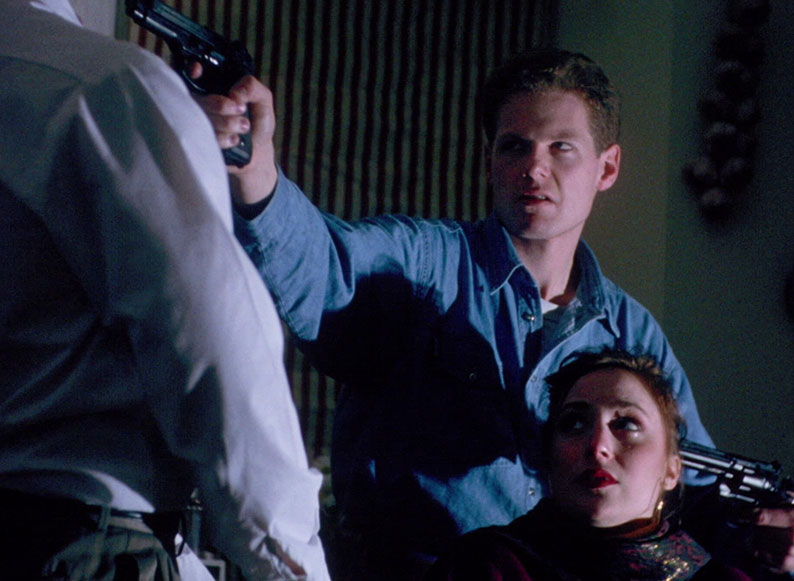
Although well structured, the pacing occasionally lags a little, and I do wish I'd formed a stronger bond with Byron and Megan before they find themselves at Peter's mercy. The police station scenes ultimately feel like expositional bolt-ons, and I did initially wonder if their talk of Peter's reputation was enough for me to really see him as the threat that he needed to be, but as the film progresses I was given plenty of reason to start fearing his every appearance in the attic room in which Byron and Megan are imprisoned. By this point in cinema history we'd been in this situation many times and often to nail-chewing effect – check out James Landis's 1963 The Sadist or Richard Brooks' 1967 adaptation of Truman Capote's In Cold Blood to get you started – but Murphy still brings a distinctive enough edge to the drama to allow the film to stand on its own merits. There are many moments here that really register, often when the actors are given lines that they can really work with, from the sometimes colourful nature of Peter's intimidation of his prisoners to the perfectly pitched casual first exchange between him and fisherman Freddy. Another confident, well written and solidly performed work from a director who was really coming into his own by this point.
(1995) (90:31 / 81:18)
Young priest Father John Doyle (James Reynard) is called to a quiet English village to help a young girl, Emily (Kate Steavenson-Payne), who her parents Eric (Kevin Ryan) and Jude (Judith Holding) believe is possessed by the Devil. While in the village, Father John is invited by American landowner Christopher Cavenham (Timur Kocak) to stay with him at the Old Rectory, a building that has been in his family for decades. Also living at the house is Claudia (Lisa Fornara), who has worked for the estate for some years, and while Christopher is busy with Father John and Emily, she is visited by her brother Paolo (Alan Jansen), who tries unsuccessfully to convince her to turn her back on this place and leave with him. She declines, and when Paolo attempts to depart, his car is intercepted by a group of locals and he is pulled out, taken to an isolated barn, and tied to a cross to await some unspecified fate.
What appears to start as a late-to-the-party tale of demonic possession soon develops into an English countryside folk horror, one in which Murphy seems initially to be referencing what we can presume are some of his favourite horror titles. There's a touch of The Exorcist to the opening scene, a 'virgin tortured by the sounds of sex' nod to Repulsion, and even a diversion to play The Most Dangerous Game. Casting the largest shadow of all is The Wicker Man, from a tree-hugging naked dance in the woods that hypnotises father John and recalls Britt Ekland's dance of seduction in Robin Hardy's film, to the strong possibility that Father John has been lured to the village under false pretences to become a sacrifice to pagan religious practices. Whether this is the case I'm not about to say, but late in the story I began to suspect that Murphy was playing with our movie-fed expectations in order to pull the rug from under our feet. Again, my lips will remain sealed on whether he does so or not.
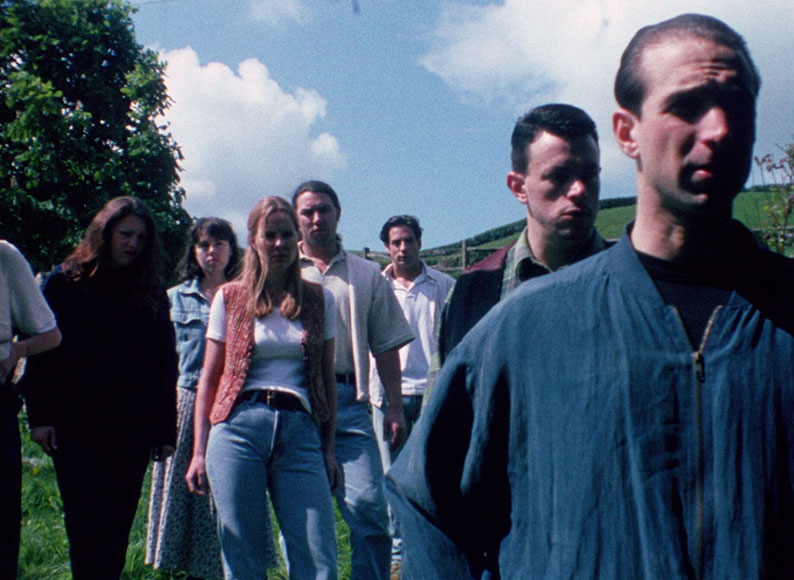
The performances of the leads are once again impressive, with three of the key players from Road to Nowhere returning here in very different roles and again really bringing Murphy's script to life. It's a glum-looking film, with interiors that look brighter than the footage shot outside in the daylight, but this adds to the film's increasingly unsettling atmosphere, and I'll freely admit that by the halfway point, I genuinely didn't know how the rest would play out. It leaves some questions teasingly (and a little frustratingly) unanswered, but is still an intriguing and enjoyable genre work that nicely misdirects us and plays its winning cards close to its chest.
The option is presented here to watch the film either in its original 90 minute version or a re-edit carried out by Murphy some years later that shortens the running time by nine minutes, tightening the pace, and featuring an alternative score and some video-generated effects. While the original version is presented from a 2K restoration, the re-edit has been sourced from a standard definition master. I quite like the score on the re-edited version, but much prefer the rich film look of the restored original cut.
(1999) (108:11 / 101:29)
I have to admit to being just a little apprehensive about watching this one. As I noted above, I elected to watch (almost) all the films in this set in chronological order, and I was really taken by Murphy's 1986 version of this tale, in no small part for how resourcefully he'd managed to cope with what was clearly another miniscule budget. But it had the best script and some of the best performances in a Murphy film to that date, and the tale it told was an enthralling one. Did it really need a remake? Oh, ye of little faith. Whereas in the original the strengths comfortably outweighed the weaknesses, in the 1999 version those weaknesses have effectively been eliminated, and what we have instead is a take on the story that is superior to its predecessor in just about every respect.
Murphy has here rewritten the script to expand on some story elements, and has at his disposal a frankly excellent cast, all of whom treat the material with the same degree conviction and respect they would have for a Shakespearean tragedy, which this story in some ways resembles. Scott Wright makes for a suitably handsome and muscular hero, Kate Steavenson-Payne is a believably headstrong but love-struck Princess Iseult, and there is strong support from Nicholas Bowditch as the duplicitous Andret, Rachel Paris as Iseult of Brittany, Beth Meller as her loyal and self-sacrificing handmaiden Branwane, Robert Bartlett as Tristan's devoted knave Cuvenal, and James Reynard brings a humble nobility to King Marc, making the prospect of a marriage to him seem hardly the worst of fates.
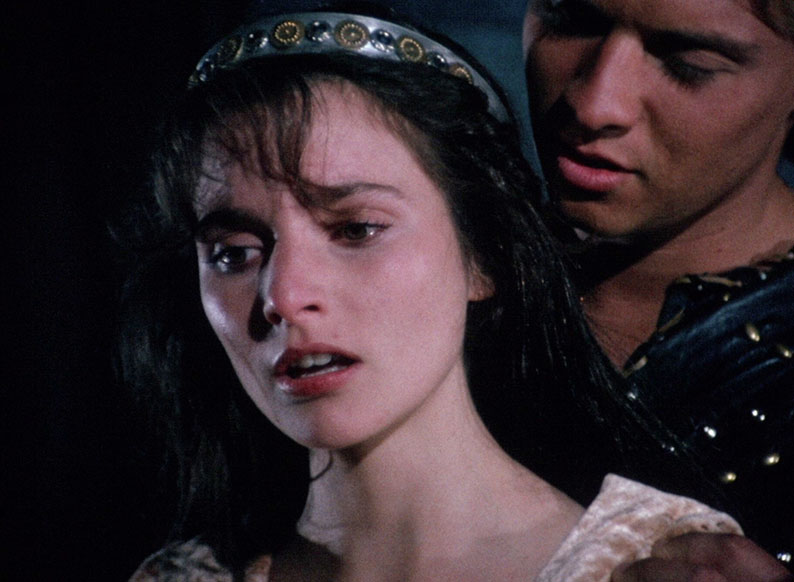
The changes made are subtle but build on the strong foundations laid by the earlier film. Here the love that develops between Tristan and Iseult grows naturally during the course of their journey from Ireland to Cornwall, and the love potion given to Iseult by her father is drunk by both of them willingly to fully cement their union. The film is once again intermittently narrated, but this time not by a storyteller to an ageing queen but by Tristan himself from a later stage in the film, the ominous nature of which is signalled early on but only really hits home when we reach that point in the tale. Sea journeys are once again done on a budget, but this time with the aid of split-screen and a stubbornly immobile model, and the action scenes are impressively choregraphed (by fight co-ordinators Chris Gainey and Chris Jupp) and performed by the actors with the sort of gusto that gives the impression that they really were trying to do each other serious harm. They're also shot and edited to maximise their impact, one more element of the handling that marks Tristan as Murphy's most assured and impressive work to this date.
Once again, Murphy later returned to the film and re-edited it, shortening it by seven minutes and changing the score. As with The Rite of Spring, the original is presented from a 2K restoration and the re-edit from a standard definition master. No question, the original version works just fine for me and looks great here, so I'm sticking with that.
And now, completely out of chronological order…
(1970) (60:12)
Murphy's earliest stab at the Tristan story appears on disc 1 and chronologically is the third film in this set. When you elect to watch the film, however, a series of introductory title cards added by Indicator inform you of the issues that the passing of time has inflicted on this version. As with several of the earlier films in this set, the missing 16mm material restoration had to be replaced by Murphy's camcorder record of a screening at his home, but even this doesn't cover all of the absent footage here. Large portions of the soundtrack have also been lost, sometimes due to – "frustratingly," the title card says with just a whiff of irritation – Murphy recording over it himself. Whole sections thus play out accompanied by classical music instead of the original soundtrack, and further title cards intermittently appear to fill in the gaps in the narrative left by the lost material. As a result, first-time viewers are advised by the captions to watch the later adaptations of the tale before approaching this one in order to have a better understanding of the story's characters and events. It's advice that I dutifully followed, and it thus made more sense to discuss the film here, as I by this point had already written twice about the story's plot and characters.
The mere fact that Murphy filmed this story three times suggests it must have been dear to his heart, and it genuinely seems to have inspired him every time, proving to be artistic highpoints at three sperate stages of his career. Obviously, with so much of the original soundtrack missing it's hard to really judge the performances here, but for the most part they seem solid enough, and cinematically there's a confidence to Murphy's handling that technically lifts the film above the director's other short works of this period. The story is at its most straightforward here, and although most of the key story beats are the same as in the later versions, each of the remakes expands on the tale told in this first version. Once again, however, it's Murphy's ambition at such a young age that really marks this one out, with costumes, constructed sets, crowd scenes and even a castle location giving it the feel of a bigger production than it doubtless was. And can I be the only one who was struck by the villain Melot's visual similarity to Ker Avon from Blake's Seven?
ROXI (2004) (95:53)
22-year-old Sean (Ross Maxwell) travels from Scotland to a quiet Greek island for a holiday and to meet his new stepmother Roxi (Mary-Anne Barlow), who married his millionaire father after his mother was murdered in a bungled break-in. Roxi owns a local bar that bears her name and that was bought for her by new husband, who was supposed to be accompanying Sean on this trip but failed to make it to the airport in time for the flight. Although Sean openly resents his father, he also seems to be harbouring a deep dislike for Roxi, and one evening tricks her into believing that he is rolling drunk and tries to come on to her before revealing why he failed to turn up to their wedding. This, and a knife found hidden in a drawer in his room by Roxy's young Greek bar manager Christina (Valia Yanarou) makes him the target of suspicion when a local girl ends up murdered in the very same manner in which his mother was killed.
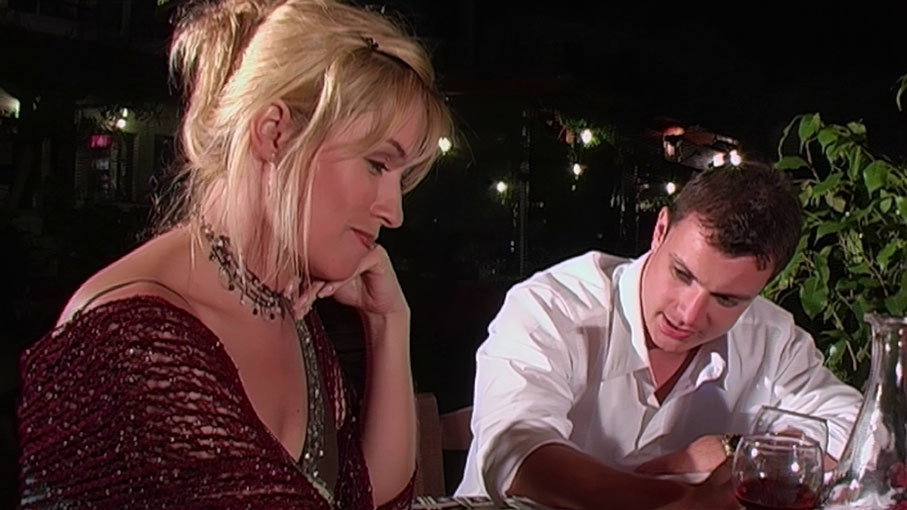
If any of this sounds familiar it's because Roxi is effectively a remake of Murphy's 1981 Death in the Family, complete with similar early story beats and even a couple of repurposed lines of dialogue from the earlier film. The key difference here is one of production quality – the lead performances are strong, Murphy's confidence as a director has grown considerably, and the arrival of mini-DV and affordable prosumer camcorders enabled him to shoot for the first time on video in the 16:9 aspect ratio. It also soon becomes clear that despite having the same basic premise, the story will not unfold in the exact same manner as Death in the Family, although familiarity with that film did lead me to expect a late film revelation would then be undercut by further twists before reaching its satisfying conclusion. Once again, it's a very well told and impressively character-centric story whose pacing frankly makes its 96 minute run time fly past, and for a standard definition DV-shot production, this film looks good.
(2009) (86:13)
Escaped young asylum patient Dan (Warren May) stumbles into the grounds of a private country club and is challenged by its confident, middle-aged owner, Martha Tennent (Judith Holding). Instead of calling the police, she convinces the injured and frightened young man to take refuge in her home, where she offers him food, drink and a shower, but she clearly has designs on him from the off and secretly spies on him while he is showering. Eventually, she convinces Dan to stay at the house for as long as he needs to in exchange for doing odd jobs for her, even lying about having seen him when enquiries are made about him by a local police inspector (Jackson Payne). Also in her employ is young and attractive restaurant manager Charlotte (Trudi Tyrell), and it soon becomes clear that she and Martha have possibly sinister plans for this muscular young man.
Murphy kicks off here by recycling a gag from Bloodline as Martha loafs in front of the TV watching one of Murphy's earlier films and switches it off with a contemptuous "Rubbish," a self-depreciating, wink-at-the-audience dig at his own movies. And I'm on the fence on this one. Despite some admirable elements, for me this had the feeling of an hour-long film stretched out to feature length, with the enjoyable mid-film reveal a long time coming and so repeatedly telegraphed that it didn't deliver the surprise that was doubtless intended, though it's still nicely handled. The second half develops into a series of trust battles that play with taboos that by this point had long since been broken, and the main story concludes with a subgenre switch that plays almost like a literal case of story-wrapping diaboli ex machina. And while the lead actors are enjoyable to watch and really commit to their roles in the film's second half (both May and Holding are superb in the scene pictured below), they do sometimes feel just a tad more 'performed' than the winningly naturalistic turns that made the drama in Roxi so believable.
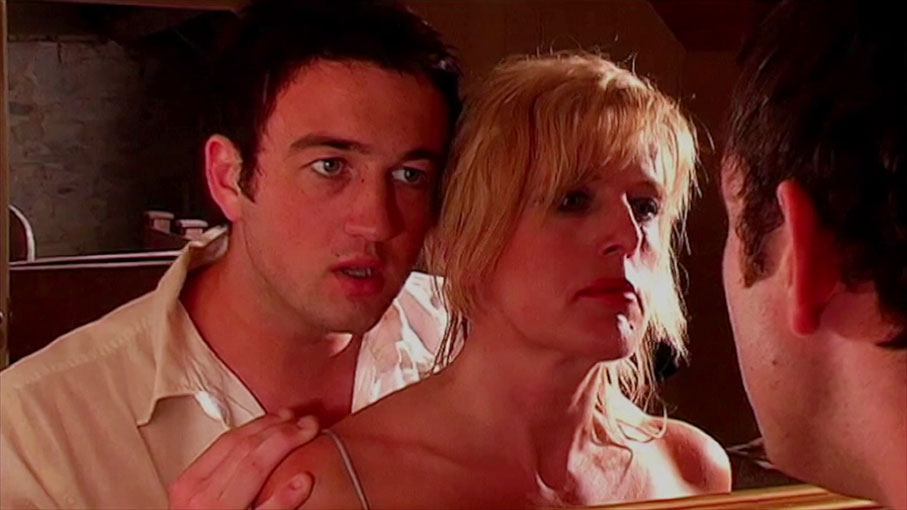
Yet Skare still delivers on a number of fronts. Hardcore horror fans will doubles appreciate its nods to 80s slashers and the work of Herschell Gordon Lewis, the grisly nature of the makeup effects, and the cheery brightness of the liberally splattered blood. The early scenes also wittily invert the traditional leery male and his potential female victim aspect of the genre, with the young muscular male asylum escapee seriously intimidated by the sensuality and confidence of a lonely older woman. Murphy even flips a famous image from Psycho by having Martha remove a picture that covers a hole in the wall that allows her to watch the naked Dan in the shower, complete with a huge close-up of her widened eyeball. Others will relish this one, and while it's not one of my favourites, I have to admit that my fondness for it grew with a second viewing.
(2012) (78:17)
Hugely successful horror author Nathan Prince (Philip Lyndon) reluctantly agrees to give an interview to respected and persistent journalist Amanda Blake (Judith Holding) at his
Greek island home. Nathan only ever writes a single novel at each location before moving on, a practice he is able to now do with ease because of the financial success of the movie adaptation of his last novel, Zombie Knights. Now commissioned to write the screenplay for the sequel, he is visualising how the film will look as he writes, casting himself as the lead character, a mad scientist who creates an army of Nazi zombies. When Amanda arrives and starts conducting her interview, Nathan starts writing her into the story, and she soon begins having unnerving visions of zombified locals and suspecting that Nathan's fantastical story might have a basis in reality.
What begins like a cheapjack throwback horror flick, with iffy zombie makeup and cheesy green screen effects, develops over the course of the film into a far more thematically intriguing work. I will admit that the extracts from Zombie Knights made me wonder how on earth it had become the commercial hit the characters claim it was, but in the first half of the film, almost nothing is quite what it seems. What I really found fascinating about ZK3, however, was the sheer range of subtextual readings offered by just about every section of this unevenly told tale. Whether all of these were intended I'm not in a position to say, but with Murphy returning once again to a favourite theme of the relationship between the creator and their work (see also Bloodstream, Torment and Second Sight), I'm willing to bet at least some of this was programmed into the film's DNA. Areas touched on here include the downside of celebrity worship, the commercial pressures on creators to compromise their vision, how trends can be fuelled by herd mentality, the potentially damaging relationship between creators and their agents and the controlling hands of studios, and seriously, I'm just getting started here. Once again, I suspect Murphy has something of himself into the character of Nathan Prince, and he teases two strong performances from favourite actors Philip Lyndon and Judith Holding.
(2014) (97:04)
Not long after a new group of tourists arrive on the Greek Island of Nekros, smilingly shepherded by young tour guides Ellie (Natalie Morgon) and Carl (Peter Griffiths), their holiday is disrupted when a local fisherman dies of the plague. The authorities arrive from the mainland in hazmat suits to disinfect the area, and although no-one else is infected, the tour group is ordered to remain there for a five day quarantine period. Yet something else is clearly amiss here, and when Ellie goes to check on one of the tourists, Leonard (Les Davis), she finds him dead with a funnel full of wine wedged in his throat. After failing to reach Carl by phone, she flees the scene, but when she returns with visiting ancient history specialist James Laughton (Philip Lyndon), they find no sign of the body, and Leonard's wife Ioanna (June Bunday) sweeping the room as if nothing untoward has happened.
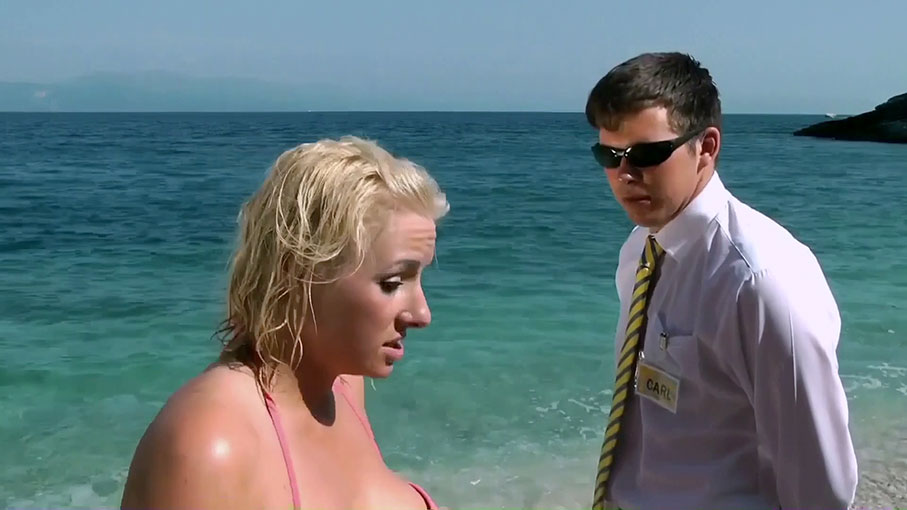
It's hard not to suspect the influence of Mario Bava – coupled with the low budget slashers of the 1980s – on the murderous and sometimes bloody mayhem that subsequently unfolds, as various guests are stalked and horribly killed by what fleeting glimpses initially suggest is a Pan-influenced cheapjack monster. And the only one who sees anything untoward is Ellie, whom none of the menfolk believe, of course, though that does soon change. Some of the performances bravely follow suit, although asking several of the actors to deliver their lines in a range of iffy foreign accents was probably not the greatest idea that Murphy ever had. I will give props to Natalie Morgon as Ellie, however, who not only holds her own when things get tricky but really looks the part of a uniformed tour guide, right down to her hair and skin tone – full marks to costume designer Jocelyn Bernardie (actually Murphy wearing one of his pseudonyms), hair stylist Anna Stamos and make-up artist Alfonso Garranis. For me, it all felt a little ramshackle, and then to my complete surprise, in the final 15 minutes Murphy pulls everything together with the sort of style, imagination and confidence that prompted me to rethink everything I'd just seen, and ended the film in a manner that was so oddly – and in some ways abstractly – satisfying that I was left convinced that I had enjoyed every second of what had gone before.
(2015) (81:59)
Having watched so many films by the same director over the course of four busy weeks, I had by this point developed an affection for Murphy and even for the films of his that didn't quite click for me. Now I was at the end of this long run, and I so, so wanted the final 82 minutes spent in his company to be quality ones. Please, I quietly thought to myself, let this be one of his best, a final slice of low budget cinema from a filmmaker whose vision I like to think would have been corrupted had a rich benefactor given him millions to make a studio-sized movie with. More than anything, I didn't want to hate what was not just the final film in this set, but the last film that Murphy made before dying at the too-young age of 63 on 10 April in the same year that The Return of Alan Strange received its limited UK release. As with all of the preceding films, I went in knowing next to nothing about it apart from the title. And I liked this title. As for the film, little about his previous work had prepared me for what Murphy delivered here. It's not a horror movie, it's not a twisty thriller, and it's not a historical tragedy. Yet despite this – and fans of his genre works will doubtless hotly disagree – for me The Return of Alan Strange is a film that showcases Murphy the writer and director at his very best.
The setup is simple but layered with potential. It's 31 December 1989, and actor Alexander Beck (Philip Lyndon) has invited fellow thespian Peter Hennessey (Patrick Olliver) to a rather special New Year's Eve party at his Dartmoor countryside home. It quickly emerges that there's no love lost between the two men and that Peter still holds a serious grudge against a man who was once his close friend. The root of this animosity lies in the once hugely popular and still fondly remembered paranormal detective TV series Alan Strange, which is soon to be rebooted. It turns out that Peter originated the role, but was later let go when it was revealed that he was gay at a time when homosexuality was criminalised in the UK. Alexander was then cast in the role in his place, a lucrative part that over the years has made him rich, whilst Peter only has enough money to feed his unwavering addiction to strong drink. Helping out with the catering for the evening are enthusiastic neighbours Delia and Dean Bradford (June Bunday and Mark Davidson) and their adult son Daniel (Daniel Bailey), a recent theatre school graduate whose dream is to land the title role in the Alan Strange reboot. What nearly tips the already testy Peter over the edge, however, is Alexander's surprise guest, Peter's estranged ex-wife and fellow actor Gaye Delaney (Judith Holding).
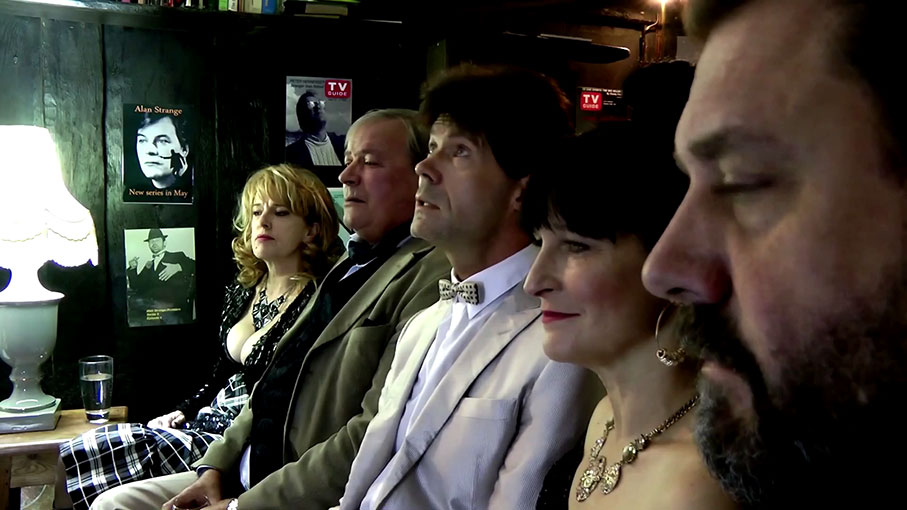
Given Murphy's track record, this sounds like foundation work for a tale in which characters start mysteriously being killed off or have some diabolical and intricately worked-out plan to destroy each other, and I have to admit to initially suspecting that this would be the case. By the halfway mark, however, it was becoming clear that what was important here was not the story but the backstory and its impact on the lives of the trio of middle-aged actors around whom the film is constructed. Changing times play a crucial role here, with Peter losing a plum TV role because he was effectively outed as gay at a time when love between two men was a criminal office, then ironically replaced with another gay actor who had more successfully kept his sexuality tucked away in the closet. Other interesting themes are explored in the process, from how the stardom that could once make you little more than a comfortable living can be the source of seemingly untold riches just a few decades later (check out how much even top footballers were paid back in the early 60s and compare it with the obscene amounts thrown at them today) to how lives were once wrecked by laws that are now regarded as almost medieval in their prejudicial cruelty. It's this that provides Peter's resentment with a degree of justification, sacked as he was from a plum role because of his homosexuality, then replaced with an actor who was deemed acceptable for the role because the media was unaware that he was also gay. Piling irony on top of irony, the 1967 Sexual Offences Act, which decriminalised sexual acts between men in private, was probably passed shortly after Peter lost his role to a man whose homosexuality would soon be no grounds for dismissal even if discovered.
Murphy's screenplay is one of his best, but what really makes it work are the performances of its talented leads, with Murphy regulars Patrick Olliver, Philip Lyndon, Judith Holding and June Bunday all on absolute top form here, making me ache for the next film they might have made with Murphy (and the special features suggest it could have been a doozy) were it not for the director's untimely death. As battling queens Peter and Alexander, Olliver and Lyndon walk a tightrope between reality and theatrical camp without ever tumbling, creating fully rounded characters whose flamboyant gayness never feels mocking or played for stereotypical laughs. Peter may play the predatory queer card when he first encounters the handsome young Daniel, but this is revealed over the course of the film to be part of a mask that he is hiding his depression at the loss of his former youth behind, much as Gaye does with her plastic surgery enhancements and tarty behaviour. The film saves its biggest emotional kick for its later scenes, when we learn the true reason for this gathering, one that the actors sell so convincingly that I actually had a small lump in my throat at one point. Murphy's horror fans may baulk at this resolutely tension-free drama, but for me it's the film that best showcases just how good Murphy and his stock company were when everything clicked, and I just can't get that bloody TV theme tune out of my head. "He's Alan... He's Alan Strange!"
<< PREVIOUS | NEXT >>
PAGE 1: INTRODUCTION / THE FILMS [1967-1986]
PAGE 3: TECHNICAL SPECS AND SPECIAL FEATURES >>
|